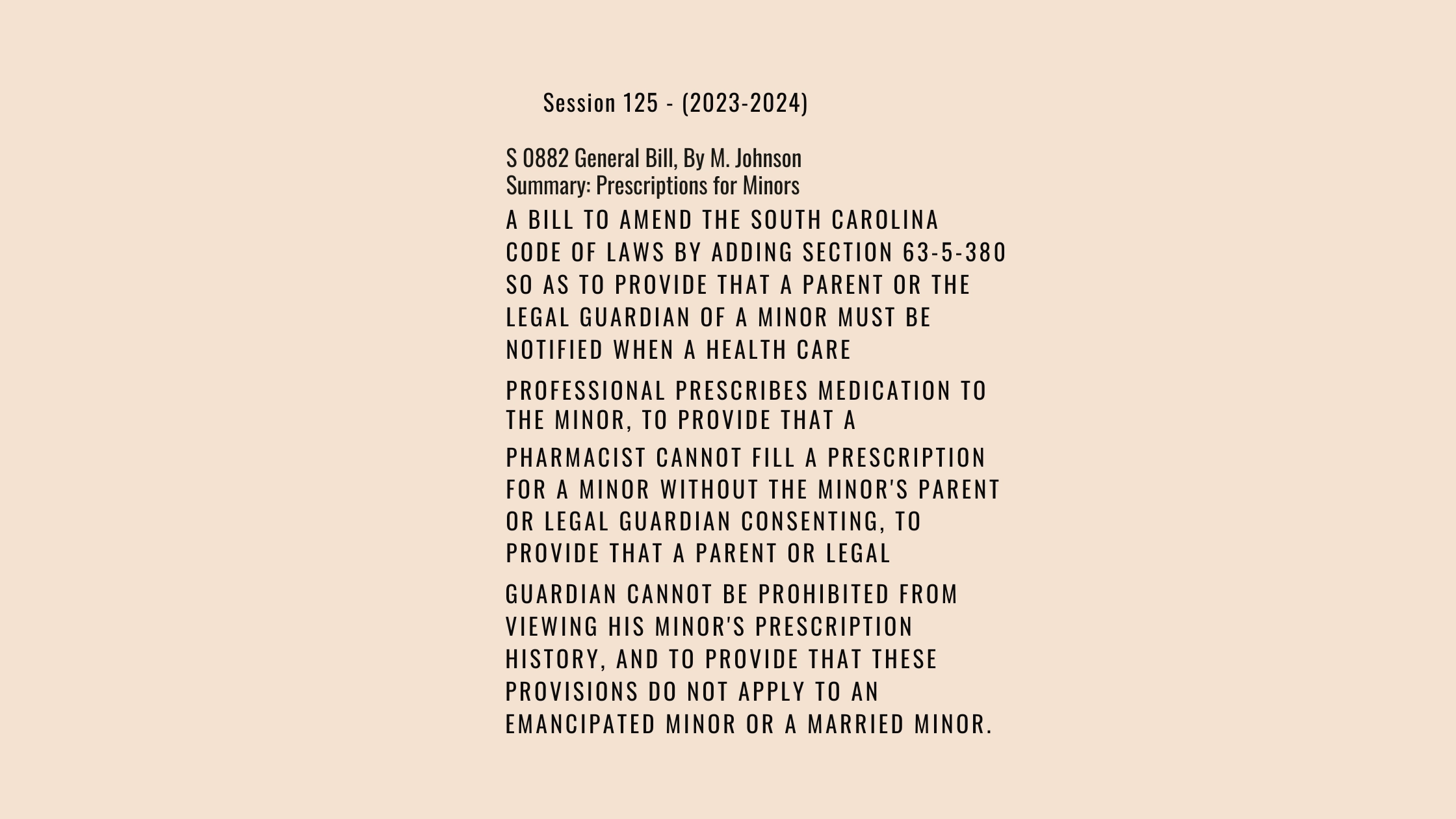Update 1/17/24
Update on S882: Prescriptions for Minors
Attention, parents with minor kids! S882 has shifted from needing improvement to becoming alarming. It has now reached the House, and the outlook is quite grim. This bill is problematic at every level. You should review the latest changes; they are concerning. After that, either call or email your Representative. Be direct: the language in this bill is a significant issue. Don't hesitate – it's important that your concerns are heard clearly and emphatically.
S.882 Amended
Concerns:
Section 63-5-380. (A)- The term "person responsible for the welfare of the minor," as used in this bill, is alarmingly vague and hazardous. Such an ambiguous definition opens the door for individuals with minimal or questionable involvement in a minor's life to make critical health decisions, undermining the very parental rights and protections the bill seeks to uphold. This lack of clarity not only poses a risk of misinterpretation and misuse, but it also inadvertently empowers those who might not act in the best interest of the minor, leading to detrimental outcomes.
Section 63-5-380. (A)The arbitrary age cutoff of 16 years in this bill is both illogical and potentially harmful. It unjustifiably assumes that minors above this age possess the maturity and discernment to make informed healthcare decisions without parental guidance, a presumption that is not accurate and disregards the varied developmental stages of teenagers. This age limit leaves 16- and 17-year-olds, who are still legally minors and dependent on their parents, vulnerable to making uninformed or pressured healthcare choices.
This bill, under the guise of protecting minors, dangerously skirts the line of usurping parental rights, a cornerstone of conservative values. By allowing certain exceptions where a medical professional can bypass parental consent, it opens a Pandora's box of scenarios where parents will be left in the dark about their own child's healthcare. This not only weakens the fundamental role of parents in overseeing and guiding their children's health decisions but also places minors in vulnerable positions, making decisions without adequate familial support and guidance. The bill, in its current form, risks eroding the sanctity of parental authority, giving undue power to the state and medical professionals in matters that should primarily be a family's prerogative.
Section 63-5-380. (B) The use of the word "may" in this bill is a glaring issue, creating a loophole that potentially undermines the very rights it claims to protect. It suggests a permissive, rather than a mandatory, stance on allowing parents or guardians access to their minor's prescription records. This ambiguity weakens the bill's effectiveness in ensuring parental oversight. Furthermore, the provision that allows a responsible person to view records maintained with the parent's records is troubling. It infringes on the privacy of the parent or guardian, as their medical information could be exposed to others under the pretext of accessing the minor's records.
Note:
Current SC Law on 16-Year-Olds Making Healthcare Decisions
Section 63-5-340 Minor’s consent to health services: South Carolina's existing law that allows 16-year-olds to make healthcare decisions without parental consent is just as flawed and needs to be repealed. It's absurd to think that, at 16, teenagers are suddenly equipped to navigate complex health decisions all on their own. This law completely bypasses parental rights and responsibilities. Expecting a 16-year-old to have the maturity and judgment to handle these decisions is unrealistic and dangerous.
S. 882 sponsored by Senator Michael Johnson is scheduled for a hearing on Wednesday, January 3 at 10:00 am -- Gressette Room TBD -- FVS Human Services Subcommittee on S.882 (Contact Info: (803) 212-6320).
Visit SCStateHouse.gov to learn more.
Please take the following actions:
Read the bill thoroughly.
Please review the suggestions listed in our Bill Review Guide below for improving the bill.
Consider testifying at the hearing to present your concerns, support, opinions, and specific suggestions to strengthen the bill in favor of parental rights.
Your involvement and testimony can significantly impact the bill's outcome. Thank you for your participation!
Outline of S. 882 - Prescriptions for Minors
Notification by Health Care Professionals: In the event a minor is prescribed medication, the health care provider must immediately notify the parent or legal guardian of the minor.
Pharmacist Prescription Filling: A pharmacist may not fill a prescription for a minor without the prior written consent of the minor's parent or legal guardian.
Parental Access to Prescription Records: A parent or legal guardian of a minor to whom medication is prescribed may not be prohibited from reviewing the minor's prescription records.
Suggestions for Improvement.
This following revised wording ensures that both healthcare providers and pharmacists are subject to similar requirements regarding prior written consent from a parent or legal guardian. Additionally, the immediate notification in Section A aligns with the requirement for consent, creating a more cohesive and clear understanding of the processes involved in prescribing and dispensing medication to minors. This alignment enhances the bill's clarity and enforceability.
(A) Prior to prescribing medication to a minor, the healthcare provider must consult with the minor’s parent or legal guardian to discuss the necessity, benefits, and potential risks associated with the medication. Following this consultation, the healthcare provider must obtain written consent from the parent or legal guardian. Additionally, the healthcare provider shall immediately notify the minor’s parent or legal guardian of the details of the prescription once it is issued.
(B) A pharmacist shall not dispense a prescription for medication to a minor without having received a copy of the consent from the minor’s parent or legal guardian.
Next, for (C), suggested revision to: The parent or legal guardian of a minor to whom medication is prescribed shall have the unequivocal right to access and review the minor’s prescription records. This right extends to all records, whether they are integrated with the parent or legal guardian’s records or maintained distinctly in the minor’s name.
Defining key terms in the bill is pivotal for enhancing clarity and minimizing ambiguity. This ensures that all parties involved have a clear and consistent understanding of the bill's requirements and expectations. Key terms that should be defined include:
Minor: Define the age range that constitutes a ‘minor’ in the context of this bill.
Healthcare Provider: Specify what qualifies as a ‘healthcare provider’ under this bill. This could include physicians, nurse practitioners, or other licensed individuals authorized to prescribe medication.
Written Consent: Clarify what constitutes ‘written consent’. Does it include digital formats? Are there specific requirements for how this consent must be documented and verified?
Immediate Notification: Define the time frame for ‘immediate notification’. Establishing a specific time frame, such as within 24 hours of prescribing, would provide clear guidelines.
Emergency Care: Further detail what situations are considered ‘emergency care’.
Prescription Records: Define the scope of ‘prescription records’. Does this include only current medications, or does it also encompass historical prescriptions?
Disclaimer
The suggestions for improvements presented here are grounded in the existing draft of the bill. We invite you to contribute further by proposing additional enhancements. Such proposals can be communicated effectively to both the relevant subcommittee and your State Senator. It's vital to remember that your active participation plays a significant role in shaping impactful legislation. Your voice is a key element in the legislative process.
Subscribe to ConservaTruth's Email Newsletter for curated insights on South Carolina's legislative activities and conservative viewpoints, delivered straight to your inbox! With vetted and easy-to-understand information, our newsletter empowers you to become an informed and engaged citizen, actively participating in safeguarding our cherished Constitutional values. Don’t miss out on crucial updates—join our community of informed conservatives today!





Comments